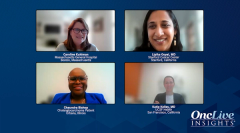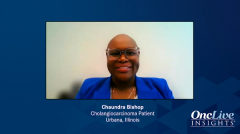
Monitoring and Managing Hyperphosphatemia
Hyperphosphatemia is the most common AE associated with FGFRi treatments and can impact patient quality of life, but there are treatments and possible diet changes that may help mitigate this AE.
Episodes in this series

This page is funded by Taiho Oncology, Inc. The faculty and publisher are solely responsible for this content. Taiho does not recommend or endorse the use of its products other than as described in the approved labeling. The content of this page is not medical advice and does not replace independent medical judgment.
This is a video synopsis/summary of an OncLive Insights involving Lipika Goyal, MD; Chaundra Bishop; R. Katie Kelley, MD; and Caroline Kuhlman, NP.
Hyperphosphatemia, defined in clinical trials as a serum phosphorus level greater than 5.5 mg/dL, is a common adverse effect of patients taking FGFR inhibitors such as pemigatinib and futibatinib. Monitoring serum phosphorus levels at 1 to 2 weeks after starting an FGFR inhibitor is recommended. Although patients can attempt a low-phosphorus diet, this is often insufficient to control hyperphosphatemia on its own. Instead, phosphate binders such as sevelamer hydrochloride are typically needed. Adherence to phosphate binders can be challenging due to high pill burden, need to take with meals, and potential adverse effects such as constipation or diarrhea. Rarely is the FGFR inhibitor dose reduced or held solely due to hyperphosphatemia. Even phosphorus levels above 7 mg/dL can often be managed with aggressive treatment using maximum doses of sevelamer and acetazolamide without needing to alter the FGFR inhibitor regimen. However, long-term treatment with high-dose sevelamer may not be well tolerated due to adverse effects.
Video synopsis is AI-generated and reviewed by OncLive® editorial staff.





































